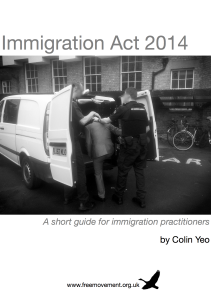- BY Colin Yeo

Weighing the public interest in deportation cases
THANKS FOR READING
Older content is locked

A great deal of time and effort goes into producing the information on Free Movement, become a member of Free Movement to get unlimited access to all articles, and much, much more
TAKE FREE MOVEMENT FURTHER
By becoming a member of Free Movement, you not only support the hard-work that goes into maintaining the website, but get access to premium features;
- Single login for personal use
- FREE downloads of Free Movement ebooks
- Access to all Free Movement blog content
- Access to all our online training materials
- Access to our busy forums
- Downloadable CPD certificates
Lawyers, judges and Home Office officials are all still getting to grips with the effect of the controversial statutory ‘guidance’ to judges on Article 8 introduced by the Immigration Act 2014. One month on it is still far too early to say how it will pan out. It will be months before we have guidance from the higher courts. In the meantime, having argued a few cases so far and heard what the Home Office has to say, I reckon the impact of the Act is very far from as great as some at the Home Office assume.
Judges are told what is in the public interest and they must have regard to that, but they must still go on and weigh the public interest against the rights of affected individuals.

To recap, the Act introduced a new Part 5A to the Nationality, Immigration and Asylum Act 2002, sections 117A, 117B, 117C and 117D. You can read a detailed analysis of the text of the new provisions in this earlier blog post: New statutory human rights considerations take immediate effect. You can also read about the Home Office interpretation of these provisions here: New Home Office guidance on deportation. Interestingly, the Home Office guidance accepts that all sorts of additional factors outside the statutory scheme and the Immigration Rules are relevant in deportation cases.
The thing about Part 5A is that it is all addressed to the public interest. The text of section 117A is critical as it tells us (and the judges) what the effect of the other relevant sections is:
117A Application of this Part
(1) This Part applies where a court or tribunal is required to determine whether a decision made under the Immigration Acts—
(a) breaches a person’s right to respect for private and family life under Article 8, and
(b) as a result would be unlawful under section 6 of the Human Rights Act 1998.(2) In considering the public interest question, the court or tribunal must (in particular) have regard—
(a) in all cases, to the considerations listed in section 117B, and
(b) in cases concerning the deportation of foreign criminals, to the considerations listed in section 117C.(3) In subsection (2), “the public interest question” means the question of whether an interference with a person’s right to respect for private and family life is justified under Article 8(2).
So, the statutory considerations in sections 117B and 117C have an impact on “the public interest question”. That question is “whether an interference with a person’s right to respect for private and family life is justified under Article 8(2)”. The duty on judges is to “have regard” to the various considerations in answering the question. Judges still have to answer for themselves the question ultimately posed by Article 8(2), which is whether interference is justified on the facts of the case.
The considerations to which judges must have regard at section 117B are clearly factors to be considered alongside other unspecified factors in assessing proportionality. For example, certain things are said to be “in the public interest” (speaking English, being financially independent. “Little weight” is to be attached to other things (human rights established at a time when immigration status was precarious). There is even said to be no public interest in deportation in certain circumstances.

These considerations (other than the no public interest, which is a default victory for any claimant) interfere very little if at all with the traditional balancing exercise that is required by Article 8. They are not exhaustive: other considerations not listed might also be in the public interest, for example. Everything still has to be considered and a judgment reached. Judges are given a clear steer as to some things Parliament considers to be in the public interest but the judge must still reach his or her own conclusion.
For the deportation considerations at section 117C, the scheme works differently. It provides an exhaustive and simplistic list of what is in the public interest. Subsection (1) states that deportation of foreign criminals is in the public interest. Subsection (2) then recognises there is a sliding scale where more serious crimes mean deportation is even more in the public interest. Subsection (3) then states that “the public interest requires … deportation” unless certain exceptions apply, and those exceptions are exhaustively defined, albeit with an element of discretion for those sentenced to more than four years (but with no discretion below that, oddly).
Section 117C tells judges definitively what is in the public interest. It does not complete their task and render them as redundant as some Home Office officials believe: section 117C does not tell judges what conclusion to reach when balancing the public interest against the rights of the individual. The case of Sporrong v Sweden [1982] 5 EHRR 85 is repeatedly cited in countless Strasbourg and domestic cases on what is required when assessing proportionality:
A court must determine whether a fair balance was struck between the demands of the general interest of the community and the requirements of the protection of the individual’s fundamental rights.
Judges are told what is in the public interest, and they must “have regard” to that. They must then go on and strike a fair balance between the public interest and the fundamental rights of any affected individuals.
SHARE


5 Responses
Months, yes. But the higher courts are bound to apply the statutory considerations to all cases in front of them at the moment, even cases which were previously decided by lower courts before 28th July 2014 (and so without reference to those considerations). This means that the very next immigration human rights case to be decided should contain relevant guidance. When that case will come who can say, but surely it cannot be very far away?
The higher courts only have to consider Part 5A if directly considering Article 8 themselves and making a substantive decision, which is unlikely. They usually just stick to error of law and this will encourage them not to remake any decisions in the meantime, I’d have thought.
Oh. So there is a kind of transitional protection for pre 28th July 2014 decisions by the FTT? Unless the higher court finds an error of law on the decision, which would have to be an error of law on the law when the decision was made, the statutory considerations don’t apply?? Makes a certain amount of sense, although I think it would be worth running an argument they do apply if it would help your case. Also I note the statutory considerations wouldn’t apply for EEA regulation matters or anything else that isn’t “a decision under the Immigration Acts”…
To take an extreme example, suppose the FTT has upheld a removal decision for the parent of a qualifying child (say the child lives with the other parent, has been here for 7 years and has leave to remain, but there’s a genuine and subsisting relationship with the appellant and this was found by the FTJ). Perhaps the parent has done absolutely everything wrong short of being subject to deportation- they have huge NHS debts, a massive history of past deception and non-compliance, etc, etc. Enough that it is at least arguable the FTT’s removal decision was correct on the old law. And the hearing was in July 2014, but before the 28th, so the FTJ didn’t apply the statutory considerations.
Would you really not argue (in addition to the old law points about best interests of child) that the statutory considerations apply when arguing error of law before the UT?
I bet the Home Office is making arguments of that kind (“FTJ did not know that immigration control is in the public interest. Therefore the decision is wrong in law.”). And I bet they get permission too, the HO get permission on any old grounds it seems. So why shouldn’t we try it, when we can?
A related question. What is the relevant date for the purposes of applying the statutory considerations. Do you check the situation at the date of the FTT hearing (or date of ECO refusal in out of country appeals)? Or can the Judge (or higher courts) take into account that, for example, a child has now (at the date they are making their decision) been in the UK for more than 7 years?
Just realised another oddity: statutory consideration doesn’t work out of country: there is no public interest in removal of parents of qualifying children but there could be every public interest in preventing them from entering!